Paul David Pope: The Deeds of My Fathers
December 12, 2010 by David
Filed under Non-Fiction, WritersCast
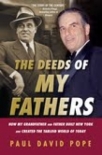 978-1442204867 – Hardcover – $24.95 – Philip Turner/Rowman & Littlefield (e-book editions available at $9.99)
978-1442204867 – Hardcover – $24.95 – Philip Turner/Rowman & Littlefield (e-book editions available at $9.99)
Well this is truly an amazing 20th century American story, and really well told by the author, who spent many years working on this book. There are characters here as big as those in any historical novel. The full title of the book gets to what the story is about: The Deeds of My Fathers: How My Grandfather and Father Built New York and Created the Tabloid World of Today.
Paul David Pope’s grandfather, Generoso Pope Sr., came to this country alone and poor, at a very young age seeking a better life, as so many other immigrants did. That part of the story is hardly unique. But he was obviously a very special sort of person, and it did not take him very long, through hard work, intelligence and a certain amount of ruthlessness, to create a building trades empire in the greatest city in America, New York City.
His companies supplied the concrete that literally built the city in the boom years of New York. But he also managed to buy and control this country’s primary Italian language newspaper, Il Progresso, and his wealth, power and connections (including political kingmakers, the mob, and even FDR as well as the Pope) made him one of this country’s leading and most influential Italian Americans. Because he was able to use his newspaper to influence elections, he essentially became a kingmaker in the old school of American politics, and was truly an iconic emblem of his times.
But author Pope does not shy away from telling us the ugly along with the good. His grandfather was far too close to Mussolini in the 1930s, and was blatantly used by the Fascists to try to influence American public opinion in their favor during the lead up to World War II. And he was far from being a good husband and father. He always favored his youngest son, Gene (author Pope’s father), and selected him to run his businesses, over his older and more experienced brothers.
Early on, Gene Americanized his name to Pope. He was pushed out of the family business after his father’s death by his mother and his two older brothers. At that point, Gene, with a loan secured from his “Uncle Frank” Costello, bought a newspaper in decline, the New York Enquirer. With a combination of dedication and a brilliant natural understanding of what average readers would want to read, he created the pinnacle of all tabloids, the National Enquirer. Of course, the support of his Uncle Frank did not come without strings, and Frank required that the paper stop attacking the mob in its stories, and in fact it was to publish only positive stories about projects the mob was backing, and even that the Enquirer would attack and discredit the enemies and opponents of organized crime – which it did without hesitation.
But the heart of Gene Pope’s story is his single minded dedication to the newspaper he loved. He moved the company to Florida and made it almost the only thing he cared about. As he grew older, he was clearly eccentric in his behavior (some might say nighly neurotic and disturbed). But throughout, Gene Pope gives readers what they want, and as the National Enquirer covers the paranormal, medical cures, celebrities, always attentive to what the average American would read, and circulation soars, peaking with the 7 million copies sold of the Enquirer’s 1977 exposé on the death of Elvis Presley.
Paul David Pope gives us a fast paced, almost novelistic version of his family’s history. His story is based on hundreds of interviews, and a huge amount of research, but of course much of what happened in the earlier part of the story is reconstructed from the documentary record. It is a gripping narrative, and a compelling story for anyone who cares about the modern history of the United States as lived by some of its more colorful and successful citizens, and the author gets across the complexity of his real life family in their non-stop rush to make their marks.
Talking to the author gave me a chance to delve into the background of the story, what motivated Paul to do all this work and stay with it for so long, and for him to talk about how his family history has affected his own life. There’s more about the book at the author’s website too.
Podcast: Play in new window | Download
Kevin Baker: Luna Park (Graphic Novel)
December 5, 2010 by David
Filed under Fiction, Graphic Novels, WritersCast
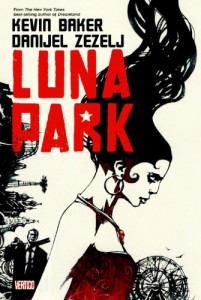 978-1401224264 – paperback – Vertigo – $14.99
978-1401224264 – paperback – Vertigo – $14.99
Luna Park is an outstanding first graphic novel by historian and novelist Kevin Baker. Baker is certainly well-known for his best selling New York City based trilogy of historical novels (Paradise Alley, Dreamland and Strivers Row). And recently he was the consultant for the History Channel’s extremely fine mini-series, America: The Story of Us, as well as being the author of its companion book.
Luna Park is centered on a former Russian soldier, Alik, who fought in Chechniya now living in Coney Island, working as the enforcer for a small time Russian mobster. He is addicted to heroin, and haunted by his memories of the horrors of the war and his own part in it. He desperately loves the prostitute Marina, whose daughter is held captive by the mob boss as a way to keep her under his control.
Alik comes up with a desperate plan he has convinced himself will save Marina, her daughter and himself. It’s at this point that the story takes a turn, as Alik discovers he is destined to repeat his past lives repeatedly, including a few pasts the present Alik does not know he had. There are flashes from present- day run down Coney Island to the Russia of 10 years ago during the Second Chechen War to an earlier time period in Coney Island, when the area was at its peak as an amusement park that really was amazing to behold.
Baker keeps us traveling with him throughout, even though the story is complex, the pain palpable and the suffering of the characters in their struggles seems to never let up. The work of the artist Danilej Zezelj is perfectly suited for this story. His art is dark, powerful and energetic, and adds tremendously to the strength of the story. DC Comics deserves praise putting Baker and Zezelj together, it’s a terrific collaboration.
Kevin Baker and I talked at length about this, his first graphic novel, both in the context of his work as a fiction writer and historian, and of course his deep interest in the City of New York, especially its seamier areas like Coney Island, as well as how writing a graphic novel in collaboration with an artist is different from other types of writing. we were able to range widely about a number of other subjects, making this conversation one I hope listeners will particularly enjoy.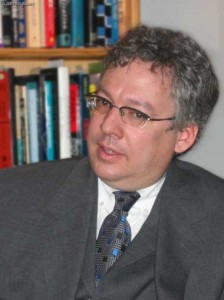
Podcast: Play in new window | Download
Dori Ostermiller: Outside the Ordinary World
November 28, 2010 by David
Filed under Fiction, WritersCast
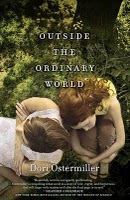 978-0778328896 – paperback original – Mira Books – $14.95 (ebook edition available at a lower price)
978-0778328896 – paperback original – Mira Books – $14.95 (ebook edition available at a lower price)
Dori Ostermiller’s Outside the Ordinary World is a very strong and compelling novel, hardly recognizable as a first novel. The novel’s main character, Sylvia, is an artist and teacher who is grappling with the messiness and unhappiness of her life. She’s distanced from and frustrated with her husband enough to risk an affair with the somewhat exotic father of one of her students. Since this is in many ways a reflection of Sylvia’s own experience as a child, when her mother spent years in her own affair, it triggers Sylvia’s memories and ambivalence about much of her own life and thus her unfolding story.
The story unfolds as Sylvia remembers her past and of course must reconnect with her family while she is trying to reconcile her own situation. We learn about her unusual upbringing as a Seventh Day Adventist, her father, the mercurial and unhappy doctor, who abused his wife and children, and her mother, so unhappy and conflicted that she allowed (or forced) her daughters to participate in her complex “other” relationship, a lack of boundary drawing that has long term ramifications for Sylvia in her own life. We also meet her grandparents and her sister in the present, for further complications to her situation.
It’s risky turf for any writer to take on love, marriage, trust, infidelity and family history with a story line and characters so close to her own. But I think imagination and creativity using the “stuff” of one’s own apparent life is precisely where the most powerful art comes from. Ostermiller writes beautifully about complex human relationships and tells a difficult story well. In many ways this novel defines how fiction really works and works best – taking the difficult journey of the soul to resolve difficult emotional and psychic issues (for both the author and the reader). I really enjoyed this book, as different from my own life experiences and situations as it was. And it was great fun to talk to Dori about her work, the issues of fiction and the mysteries of human love.
Dori Ostermiller teaches writing and literature in Western Massachusetts. She is the founder and director of Writers in Progress, a literary arts center housed in the Arts & Industry building (a refurbished old brush factory) in Florence. Many of her students have published books of their own, including Alison Smith, Kris Holloway, Ellen Meeropol, Kyra Anderson and David Lovelace.
Dori is currently working on her second novel in Northampton, where she lives. Her website is worth a visit. And I for one am looking forward to reading her next novel.
Podcast: Play in new window | Download
Ilyon Woo: The Great Divorce
November 18, 2010 by David
Filed under Non-Fiction, WritersCast
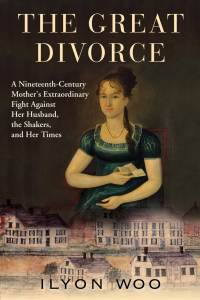 978-0802119469 – Hardcover – Atlantic Monthly Press (ebook versions available $9.99)
978-0802119469 – Hardcover – Atlantic Monthly Press (ebook versions available $9.99)
Ilyon Woo’s The Great Divorce: A Nineteenth-Century Mother’s Extraordinary Fight Against Her Husband, the Shakers and Her Times is an absolutely terrific work of historical narrative. The book tells the story of Eunice Chapman, whose husband left her, taking their children, to join the Shaker community near Albany, New York in 1814.
At that time, women had virtually no rights in society. Upon being married, they literally lost their identities, which were subsumed completely into the legal identity of their husbands. So when Eunice’s husband joined the Shakers, a radical Christian sect that espoused celibacy, communal living and the literal separation of the sexes (ironically giving women a much greater role in their communities than was common in the larger society), she had no legal way to gain custody or even visitation with her children. Rather than give up her children to her husband and a religious community with whom she did not agree, she fought her husband and the Shakers for the return of her children.
Ilyon Woo tells the story of Eunice Chapman’s years of struggle to regain her children, which is amazing in itself, given the barriers she had to overcome, not to mention the difficulties of time and distance, which made everything slower and more complicated to resolve. But of course this is also a social history of an era many of us know very little about. It’s a period when women are only just beginning to exercise social power, 30 after the establishment of the United States as a country, 100 years before women win the right to vote.
Through the lens of Eunice Chapman and her heroic struggle, Woo is able to bring this period vividly forward. We learn a great deal about the Shakers, their history, many of the individuals who made the Shaker sect at least temporarily a very successful, though highly controversial religious and social community, and the nature of their daily lives. And her portrayal of the city of Albany and the New York state legislature is absolutely terrific. Woo succeeds in highlighting individual human beings living their lives within the social and historical sweep of their times. There’s a great deal of research here that has been transformed by imagination and her terrific sense of story into a vivid portrayal of an otherwise obscure piece of social history.
This is Ilyon’s first book. I wanted to talk to her about what got her interested in this subject, and learn more about the kind of research she did to be able to tell this story. And also to learn more about how she feels about this period and the people she wrote about. It’s an amazing story that can and should help anyone faced with any challenge find it easier to rise to the occasion, especially since this is a story with a true happy ending.
Ilyon Woo’s website is here. The site features a video about the book, links to more information about the Shakers, and a really interesting tab about the dramatic readings from the book that the author has organized. Here is my favorite quote about the book: “By delving so deeply into the sources, Woo brings the past to life in all its wonderful strangeness, complexity, and verve. This is what history is all about.” —Nathaniel Philbrick, winner of the National Book Award.
Podcast: Play in new window | Download
Corinne Demas: The Writing Circle
November 8, 2010 by David
Filed under Fiction, WritersCast
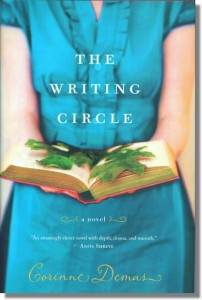 978-1401341145 – Hardcover – $23.99 (e-book edition available $11.99)
978-1401341145 – Hardcover – $23.99 (e-book edition available $11.99)
In choosing books for Writerscast, I have been trying to read as many books as possible from different styles, genres and viewpoints, to make an eclectic and interesting selection both for myself and for an audience of listeners. I suspect that if it had not been for that effort, I simply would never have discovered Corinne Demas and her new novel The Writing Circle.
It’s not so much that this novel is outside the scope of my literary tastes, as in fact, I really like well written novels that explore character and whose narrative is subtle and skillfully enough handled that I can’t feel ahead what is going to happen. I suppose in one way that just means I like to lose myself in a novel and not feel like I can feel the wheels and levers turning as I follow on. But I just may not have picked this book off of a book display in a bookstore to read, maybe because it’s a book about writers and that might normally seem sort of self reflexive to me. Thus the lesson, if there is one, is to remain open to surprises and to not make judgments about a book just from it’s title. A funny idea indeed.
I definitely enjoyed reading this novel quite a bit. Corinne Demas is a very fine writer. I think the word that comes to mind for me is “deft.” There are a number of characters here, all of whom are important, and the way the story is told reminded me of an ever tightening spiral, as we start from the seeming mundane outside and move ever closer into the lives of these people around a series of events that provides the structure of the book. This is a very well put together novel. After reading it, I wanted to rush out and talk to Corinne Demas about the book and how she imagined it, and all the characters (guessing of course that she had been in writing circles herself).
I always feel that when I am talking to a novelist it’s critical to balance between talking engagingly about a book I just read and that I feel excited about, and not giving away too much to anyone who might be listening and themselves eventually read the same book. That certainly applied in this talk, as we danced around the story outline while talking in depth about the book’s structure and her involvement with these very compelling characters. That was fun too and I hope listeners will enjoy that balancing act.
Corinne Demas is a talented and accomplished writer – she’s written adult novels, short stories, children’s picture books and chapter books, a play and she writes poetry as well. In addition, she teaches full time at Mt. Holyoke, which we also talked about a bit in this conversation. 
Podcast: Play in new window | Download
Martin Lemelman: Two Cents Plain: My Brooklyn Boyhood
October 31, 2010 by David
Filed under Graphic Novels, WritersCast
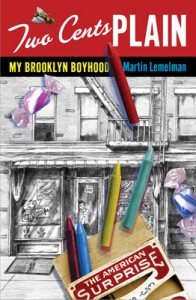 978-1608190041 – Bloomsbury – Hardcover – $26.00.
978-1608190041 – Bloomsbury – Hardcover – $26.00.
Martin Lemelman grew up in the back of a candy store in Brooklyn, NY. He has illustrated more than thirty children’s books and his work has appeared in numerous magazines. Lemelman is now a Professor in the Communication Design Department at Kutztown University and lives in Allentown, Pennsylvania.
Martin’s first memoir done in graphic format, with drawings, photographs of personal objects and places, was Mendel’s Daughter, published in 2006. Told in his mother, Gusta’s voice, the book recounts the story of her life, beginning in pre-war Poland, through her harrowing experience of survival in the Holocaust and displaced persons’ camps, and finally coming to Brooklyn, where she lived with her husband (also a survivor) and two children.
Two Cents Plain is not literally a sequel to Mendel’s Daughter, but it is a continuation of Lemelman’s family storytelling. Two Cents Plain collects the memories and artifacts of the author’s childhood in Brownsville, a neighborhood of Brooklyn filled with Jews speaking Yiddish and children growing up in a comfortable city neighborhood. Later in the story, as times change, Martin and his family’s experience in Brooklyn is not so pleasant. But that’s ultimately the background of the story Lemelman tells. His real focus is the dynamic story of his parents and how their life experiences in the Holocaust shaped them, and of course shaped their children’s experience as a family in post-War America.
Lemelman’s story is full of struggle, his parents were complicated and sometimes difficult for their children to understand, and life in a candy store was never easy. But his Brooklyn memories also is also include the joys of egg creams and comic books, malteds and novelty toys, where the neighbors, the deli man, the fish man, and the fruit man, all are brought to vivid life in story and illustration. The changes in the city during the sixties are very personalized for Martin and his family and in the climax of the story, the family must leave their home once again.
I really loved reading and absorbing this book, the combination of Lemelman’s story telling voice and gorgeous illustrations work beautifully to transport the reader into another time and place. And the author does a fine job of balancing between the sentiment of memory of his childhood with the clarity of the adult rememberer, which is keeps us anchored as the story unfolds. There are layers of memory, emotion, people and place that are richly evoked in this book.
In our interview, I wanted to explore with Martin not only the story of his life and his parents gripping and sometimes painful experiences, but the period of the fifties and sixties and how he used the graphic memoir form to reflect and amplify the power of his story. This is a unique and wonderful book whose creator is quite cogent about his work. Martin has put together a very interesting and useful website for the book that is worth visiting (most useful after you have read the book, I think). I am looking forward to reading the next book in this series of memory stories.
Podcast: Play in new window | Download
Bill Barich: Long Way Home: On the Trail of Steinbeck’s America
October 23, 2010 by David
Filed under Non-Fiction, WritersCast
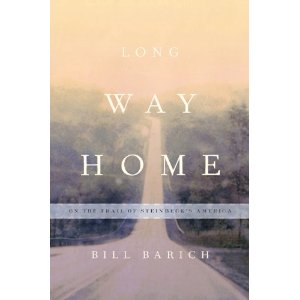 978-0802717542 – Walker & Co. – Hardcover – $26.00 (e-book version also available)
978-0802717542 – Walker & Co. – Hardcover – $26.00 (e-book version also available)
Bill Barich is a fine writer, comfortable with words, a natural storyteller who is self-aware and a careful observer of character as well as landscape. He’s got a great narrative voice that makes his books very easy to read and deeply engrossing.
In the summer of 2008, Barich, who has lived in Dublin, Ireland for some time, decided to take a journey across America, essentially following in the footsteps of the great John Steinbeck, who made the cross-country journey (ostensibly to rediscover America, but more likely a stab at rediscovering his own literary voice, which resulted in Travels with Charley in 1962).
Of course Barich and Steinbeck differ in significant ways. And the early 1960’s were a very different time than 2008 for America. Barich’s trip came at the time of our massive economic collapse, and the rising presidential campaign of Barack Obama, both of which become thematic backdrops for his story. Steinbeck traveled in pick up truck with a home made camper out back, and with his dog, Charley, whereas Barich drove a rented Ford Focus (almost 6000 miles!) and stayed in motels. But Steinbeck is the ever present model for the later traveler, whose outlook is certainly as different as the country he explores.
In fact, Barich’s story is engrossing from beginning to end. He starts the trip in Maryland, and stays on US 50 west to the Golden State, with stops and sidetrips along the way that are always interesting, even though often sad and sometimes even depressing. He is, after all, reporting on America as he finds it, which includes features and political themes that are not always what we might have wished or hoped for. It’s an honest portrait, and a story well told. I’ve done my share of cross-country traveling, and very much enjoyed this book and my conversation with Barich about it. There’s a good deal of back story and detail in this conversation we had some fun with and which I hope listeners will enjoy.
Bill Barich is the author of seven books, including Laughing in the Hills, which was named one of the hundred best sports books of all time. Other works include a novel, Carson Valley, and another work of nonfiction, A Fine Place to Daydream: Racehorses, Romance, and the Irish and recently, A Pint of Plain which describes the decline of the traditional Irish pub. A Guggenheim Fellow, and literary laureate of the San Francisco Public Library, Barich now lives and works in Dublin.
Podcast: Play in new window | Download
Nick Schou: Orange Sunshine: The Brotherhood of Eternal Love and Its Quest to Spread Peace, Love, and Acid to the World
October 13, 2010 by David
Filed under Non-Fiction
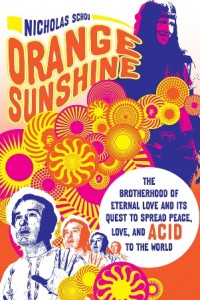 978-0312551834 – St. Martin’s Press – Hardcover – $24.99
978-0312551834 – St. Martin’s Press – Hardcover – $24.99
Nick Schou writes for the excellent OC Weekly (one of the several Village Voice papers) based in Orange County, California, home of Disneyland, Knott’s Berry Farm, UC Irvine, the Los Angeles Angels of Anaheim, Little Saigon, and of course seemingly endless tracts of California suburbia. But Orange County in the 1960’s was also the birthplace of some of the most amazing scenes of hippiedom, and the little known “Brotherhood of Eternal Love.”
In this book, Schou tells their story from beginning to end, and it is a pretty incredible saga, including what was probably the largest LSD manufacturing and distribution operation of all time, a world wide hashish and marijuana smuggling cartel, incredible tales involving Timothy Leary, and much, much more.
Known as “Hippie Mafia,” the Brotherhood began in the mid-1960’s as a small band of surfers (and in many cases petty criminals) in Southern California. After they discovered LSD, they took to Timothy Leary’s mantra of “Turn on, tune in, and drop out” and resolved to make that vision a reality by becoming the biggest group of acid dealers and hashish smugglers in the nation, and literally providing the fuel for the psychedelic revolution in the process. In Orange Sunshine, Schou journeys deep inside the Brotherhood, combining exclusive interviews with many of the group’s surviving members, former hangers on and supporters, and interstingly, the law enforcement establishment who pursued them and by doing so helped to launch what has now become an institutionalized government war on drugs.
Schou tells a compelling story of sex, drugs, and rock ‘n’ roll (and more drugs) that runs from Laguna Beach to Maui to Afghanistan, and a time when America moved from the golden era of peace and free love into the much darker time that soon followed, marked by hard drugs, international crime and paranoia.
Talking to Nick Schou gave me a chance to explore with him some of the background to the book, and to talk about the large amount of research he did to put it together, and the challenges he faced in getting some of the participants to even tell him what they did in those days. We also talked about some of the more startling elements of the story of the Brotherhood, their involvement with Timothy Leary and Ram Dass, Orange County then and now, and much more.
This is a fascinating story, one that helps us understand some of the complex issues that began in the sixties and are still with us today. This kind of grassroots history is important to document as it can give us all a chance to better comprehend the always diverse and sometimes simply amazing culture in which we live.
Podcast: Play in new window | Download
Jared Duval: Next Generation Democracy
October 2, 2010 by David
Filed under Non-Fiction, WritersCast
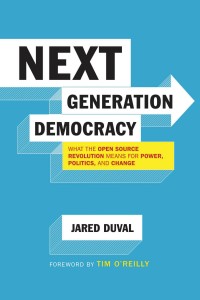 978-1608190669 – Bloomsbury – paperback – $15.00
978-1608190669 – Bloomsbury – paperback – $15.00
Next Generation Democracy is an important book by a really smart and compelling young activist and writer, Jared Duval. I like what Bill McKibben says about the book and by extension the author: “God knows previous generations have left those that are coming of age a world of trouble. Happily, they’re figuring out a world of ways to set them right. Jared Duval’s book offers a behind-the-scenes tour of the next wave of activism, organizing, inspiration, and change. It will give you cause to hope–and cause to go to work.”
But even more than a behind-the-scenes look at how activists are working and thinking together in new ways, Duval gives us a strong sense of hope for making change in the future. I think it’s true enough that the past few generations have not succeeded in broadening democracy and making progressive change throughout the world, especially in environmental, social justice and peace, as broad stroke categories of change that is needed most. But it’s heartening to know that the younger generation includes individuals like Duval who are finding new ways to make change, resist the impulse to blame and create divisions, and who see the tools of change around them everywhere, and simply make use of them so easily and comfortably.
Jared sees open source software as the exact model needed for a reinvention of democracy. Our government can be as open and transparent as the development of Linux, a story he tells here almost as a parable for political thinkers and activists. In Next Generation Democracy, Jared covers key recent events, such as Hurricane Katrina, during which de-centralized leadership emerged to supersede traditional models. He documents the success stories of these new leaders, both inside the government and out, who are finding effective, directly democratic ways to address the critical public challenges of our time. As he tells the stories of participatory organizations such as the brilliant SeeClickFix (originated in New Haven, Connecticut and now spreading to other communities) and America Speaks (which shows us how to meaningful re-engage citizens in the processes of government) Duval describes a new approach to solving complex problems that draws on the contributions of a wide array of activated citizens everywhere.
I do wish this book had come out earlier in the year, actually in time for election season, as I am certain that the thinking here could benefit anyone involved in the political process. But in the end, what really matters is that people read Next Generation Democracy, become inspired in some way, small or large, to get involved, work with their fellow citizens, make change, small or large, and address the future in a positive way. Reading this book and then listening to Jared Duval talk about his ideas and experiences certainly inspired me, and I am happy to recommend him and his book to anyone listening to this talk.
Jared Duval is a busy guy. He is a fellow at the well respected Demos policy organization and earlier served as the National Director of the Sierra Student Coalition (SSC), the national student chapter of the Sierra Club and the largest student environmental organization in America. During this time he helped build the Energy Action Coalition and the Campus Climate Challenge campaign, serving as the effort’s co-chair for two years.
Podcast: Play in new window | Download
Paul De Angelis: Dear Mrs. Kennedy, The World Shares Its Grief, Letters November 1963
September 23, 2010 by David
Filed under Non-Fiction, WritersCast
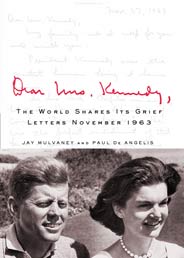 978-0312386153 – St. Martin’s Press – Hardcover – $19.99 (also available as an e-book at $9.99)
978-0312386153 – St. Martin’s Press – Hardcover – $19.99 (also available as an e-book at $9.99)
Are there more books about the Kennedys than about the Lincolns? I don’t know, but I am certain that there are many of them and my guess is that many who lived through the Kennedy era and many who did not, may feel they know everything they need to know about the Kennedys, JFK and Jackie, and the rest of the family. Reading this book may well change their minds.
In fact it’s a wonderful window into the heart and soul of America and in fact the world in the period just after the assassination of JFK in Dallas in November, 1963. Now almost a half century beyond that time, these letters, written by the famous and the ordinary, old and young, depict a period of extreme pain, emotional and social disruption, grief, sorrow, and disbelief that affected an incredible number of people all over the world. It gives us an opportunity to understand a great deal about how human beings respond to a devastating public tragedy. And some of the letters are simply beautiful, and transcendent in their expression of sympathy and emotion.
The story of the letters themselves is amazing – over 1 million condolence letters, notes and cards were sent to Jacqueline Kennedy in the months after the death of JFK. They were filed away and saved for many years, and despite a controversial culling in the 1980’s, there are still almost 400,000 letters, now cataloged and available for historians and journalists and the public to read and review. Editors Jay Mulvaney (who sadly passed away while working on this book) and subsequently Paul De Angelis, have given us a wonderful narrative and selection of letters that uses the words of the original writers to bring this terrible period in our history to life in an unusual and compelling tapestry of voices.
Paul De Angelis is a freelance editor and writer who lives in rural Connecticut. He’s been an editor, editorial director and editor-in-chief for a number of publishers. In our conversation about Dear Mrs. Kennedy, he talks about the process of putting this book together and highlights a number of the most interesting stories and letters in the book. For readers who lived through the 1960’s, this book will bring back many difficult emotions, and for readers for whom this is only history, these letters can bring the events of that period to life in a very powerful and compelling way, as the writers of these letters always speak from their hearts. You can see more from the book at Paul’s own website.
Full disclosure: the co-editor of this book, Paul De Angelis is a friend and occasional colleague, which does not make this book any less worth reading, of course.
Podcast: Play in new window | Download
